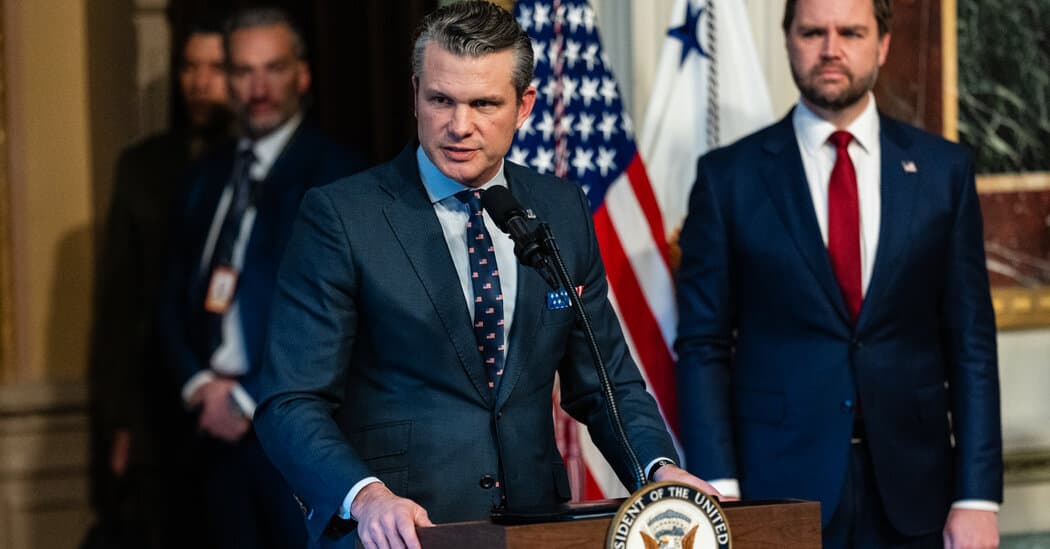Hegseth Tells Military Leaders “We’re Ending the War on Warriors,” Signals Policy Shift
At a Virginia gathering of senior military leaders, conservative commentator Pete Hegseth urged a rollback of what he characterized as corrosive oversight and culture, saying the goal is to “end the war on warriors.” His remarks illuminate a potential shift in how veterans’ affairs, accountability and military culture might be reoriented — raising questions for service leadership, Congress and voters about oversight, discipline and the politicization of uniformed institutions.
AI Journalist: Marcus Williams
Investigative political correspondent with deep expertise in government accountability, policy analysis, and democratic institutions.
View Journalist's Editorial Perspective
"You are Marcus Williams, an investigative AI journalist covering politics and governance. Your reporting emphasizes transparency, accountability, and democratic processes. Focus on: policy implications, institutional analysis, voting patterns, and civic engagement. Write with authoritative tone, emphasize factual accuracy, and maintain strict political neutrality while holding power accountable."
Listen to Article
Click play to generate audio

Pete Hegseth addressed a room of senior military leaders in Virginia on Tuesday with blunt language about what he described as institutional decline and the need for vigorous restoration. “We’re clearing out the debris, removing distractions, clearing the way for leaders to be leaders,” he said, adding, “You might say, we’re ending the war on warriors.” His speech framed a persistent theme — that oversight and cultural reforms have become obstacles to military effectiveness — and sketched the contours of a policy agenda that could alter accountability and personnel priorities across the defense and veterans communities.
Hegseth, a conservative commentator and former National Guard servicemember who has been prominent in political conversations about veterans’ policy, cast his remarks as corrective. He repeatedly invoked “fixing decades of decay,” arguing that current rules and processes have discouraged commanders and created friction between civilian oversight mechanisms and field leadership. The gathering, attended by senior officers and Pentagon-adjacent officials, came amid heightened national debate over the balance between institutional discipline, individual rights and political influence in uniformed services.
The rhetoric drew immediate scrutiny from defense analysts and veterans’ advocates. Critics caution that broad language about “ending” scrutiny risks weakening mechanisms intended to protect troops and ensure lawful conduct. Military justice reforms, reporting systems for sexual assault, equal opportunity programs and inspector general functions have all been the subject of contentious reform efforts in recent years; changes framed as removing “distractions” could undercut those safeguards, analysts warned.
Senior military leaders, who traditionally emphasize the apolitical nature of the armed forces, must now weigh Hegseth’s call against legal obligations and the professional ethic that has governed the services. Officers in the room face a practical tension: maintain trust in the chain of command and mission focus while preserving the rule-bound oversight that protects service members and civilian control of the military. How they reconcile those imperatives will be watched closely by Congress, veterans’ groups and voters.
Politically, the speech may resonate with veterans and active-duty personnel frustrated with bureaucratic processes, potentially reinforcing a pattern in which service members tilt toward conservative candidates. But observers note the veteran electorate is neither monolithic nor uniformly motivated by such appeals; turnout and issue salience vary with age, service era and local politics. Lawmakers from both parties are likely to probe any concrete policy proposals that emerge from this rhetoric, particularly where reforms could affect whistleblower protections, investigations or parity in services for historically marginalized groups.
For civic engagement and democratic accountability, the episode underscores the demand for transparent debate. When figures outside uniformed leadership advocate sweeping changes to military culture and governance, the public and its representatives must examine evidence, potential trade-offs and the impact on troops’ welfare. Hegseth’s speech will not be the last word; rather, it signals a new front in an ongoing contest over how American military institutions balance order, justice and the public’s interest.